
October 14
1882 Birth: Eamon de Valera: Irish politician, prime minister (1932-48; 1951-4; 1957-9), and president (1959-73):
An active revolutionary from 1913, he became president of Sinn Fein in 1917 and founded the Fianna Fail party in 1926. In 1937 he made his country a "sovereign" state, renamed Ireland, or Eire. . . .
De Valera's prestige was enhanced by his success as president of the council of the League of Nations in 1932 and of its assembly in 1938. He also entered negotiations with British Prime Minister Neville Chamberlain in which he guaranteed that he would never allow Ireland to be used as a base for attacking Britain in the event of war. This culminated in the Anglo-Irish defense agreement of April 1938, whereby Britain relinquished the naval bases of Cobh, Berehaven, and Lough Swilly (retained in a defense annex to the 1921 treaty), and in complementary finance and trade treaties that ended the economic war. This made possible de Valera's proclamation in September 1939, upon the outbreak of World War II, that Ireland would remain neutral and would resist attack from any quarter. In secret, however, de Valera also authorized significant military and intelligence assistance to both the British and the Americans throughout the war; he realized that a German victory would imperil Ireland's independence, of which neutrality was the ultimate expression. By avoiding the burdens and destruction of the war, de Valera achieved a relative prosperity for Ireland in comparison with the war-torn countries of Europe, and he retained office in subsequent elections. . . .
In 1959 de Valera agreed to stand as a candidate for the presidency. He resigned his position as taoiseach and leader of the Fianna Fail party. In June he was elected president, and he was reelected in 1966. He retired to a nursing home near Dublin in 1973 and died there in 1975. [For further information, click here.]
1890 Birth: Dwight D. Eisenhower:
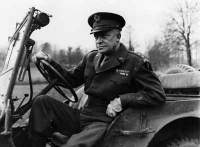
On this day in 1890, future President Dwight D. Eisenhower is born near Abilene, Texas.
After graduating from West Point in 1915, Eisenhower embarked on a stellar military career: he would eventually become the supreme commander of Allied forces in Europe during World War II and the leader of the invasion of Normandy in June 1944. Following the war, "Ike," as he was affectionately called, served as president of Columbia University until 1951, when he became supreme commander of NATO forces in Europe. The next year, Eisenhower beat out Democrat Adlai Stevenson to become president of the United States.
The Cold War and a determination to prevent the spread of communism permeated Eisenhower's foreign and domestic policies. During his first term, Eisenhower oversaw the end of the Korean War (1950 - 1953), the first major diplomatic and military confrontation between America and a powerful communist foe. (Communist China had intervened on behalf of communist North Korea in its war with South Korea, which was aided by the United States.) At home, Eisenhower supported and encouraged efforts to root out potential communist spies in America, but privately expressed disgust at the shameless tactics used by Senator Joseph McCarthy during the HUAC (House Un-American Activities Committee) hearings. In July 1955, Ike's attention turned toward communist Russia: He led a conference of world leaders in Geneva with the goal of improving relations with the Russians. Following the meetings, Eisenhower returned to the states, encouraged by what he saw as a small crack in the icy reserve of the Russian leadership.
Ike's busy presidential schedule was interrupted in September 1955 when he suffered a heart attack that restricted his activity for nearly two months. Stoic and resilient, Eisenhower recovered to embark on a second presidential campaign in 1956; he won easily. During his two terms, Eisenhower witnessed the rise of a powerful political and economic alliance between America's military and its industries might wield too much influence over American domestic and foreign affairs and warned Americans of what he called a "military-industrial complex" in his now famous farewell speech, televised across the nation on January 17, 1961.
After leaving the White House, Eisenhower and his wife Mamie traveled and remained active in public life and in the Republican Party. Their grandson, David, married President Richard Nixon's daughter Julie in 1968. The next year, Eisenhower died of heart failure in Walter Reed Army Hospital, with Mamie at his side. (History.com)
1906 Birth: Hannah Arendt in Germany, historian (Origins of Totalitarianism).
1912 Theodore Roosevelt shot in Milwaukee:

Before a campaign speech in Milwaukee, Wisconsin, Theodore Roosevelt, the presidential candidate for the Progressive Party, is shot at close range by saloonkeeper John Schrank while greeting the public in front of the Gilpatrick Hotel. Schrank's .32-caliber bullet, aimed directly at Roosevelt's heart, failed to mortally wound the former president because its force was slowed by a glasses case and a bundle of manuscript in the breast pocket of Roosevelt's heavy coat--a manuscript containing Roosevelt's evening speech. Schrank was immediately detained and reportedly offered as his motive that "any man looking for a third term ought to be shot." [For further information, click here]
1914 World War I: List Regiment Oct 11 - 20):
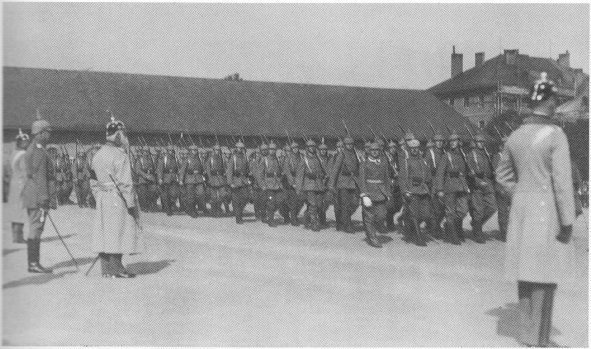
Infantry Recruit Adolf Hitler's 1st Company, 16th Bavarian Reserve Infantry, train at Lechfeld, at the confluence of the Lech and the Danube, seventy miles west of Munich. [For further details, Click here.]
1915 WW1: Various:
Britain and France declare war on Bulgaria.
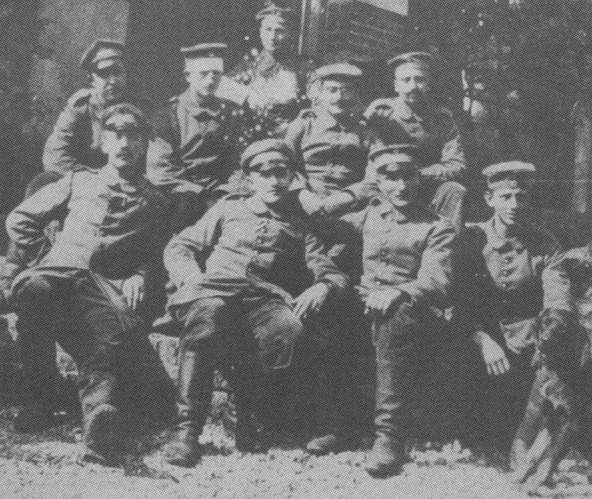
List Regiment (Oct 4, 1915 - Feb 29, 1916): Gefreiter Adolf Hitler's serves with 16 Reserve Infantry Regiment at Fromelles. [For further details, Click here.]
1916 List Regiment (Oct 9 - Dec 3):
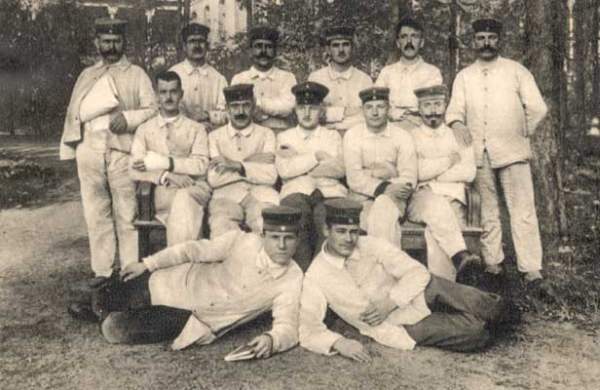
Hitler, who had been fighting almost continuously for two years, finds himself on a hospital train headed for a Red Cross hospital in Beelitz, near Berlin. While his wound is serious, he will recover quickly, and will later write Balthaser Brandmayer: "Am suffering from hunger-induced typhus because I cannot eat bread; additionally I am adamantly denied any sort of jam." [For further details, Click here.]
1917 World War I (Sep 30-Oct 17):
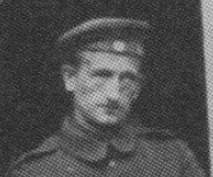
Hitler continues an eighteen-day furlough, accompanying Schmidt [above] on a visit to his sister in Dresden with him. After sightseeing stops at Brussels and Cologne, they hit Leipzig, a city Hitler especially enjoys. He is impressed by the 300-foot tall monument, Battle of the Nations, honoring the war-dead of 1812. "This has nothing to do with art," he tells Schmidt (above), "but it is enormous and beautiful." After spending some time with Schmidt in Dresden, Hitler goes off by himself to Berlin to spend a few days with yet another front-line comrade. In a postcard to Schmidt, he writes: "The city is marvelous. A real world capital. Traffic is still tremendous. Am gone almost all day. Now finally have opportunity to study the museums a little better. In short: there is nothing lacking." [For further details, Click here.]
1918 World War I:
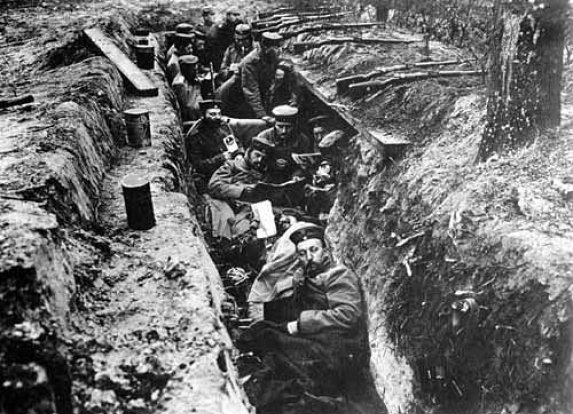
Gefreiter Adolf Hitler's 16 Bavarian Reserve Infantry Regiment, holed up in trenches by a low hill near Werwick, just south of Ypres, is bombarded by a drumfire of gas shells for many hours. The yellow-cross mustard gas slowly seeps into the primitive gas masks, and by 7:00 AM the next morning, Hitler stumbles into battalion headquarters carrying the last dispatch he will ever deliver. Nearly blind, he is soon sent to the rear for hospitalization. In 1924, while on trial for treason, Hitler will be asked if he had ever been the victim of a gas attack: "Yes. Surely, I was affected by English yellow-cross gas and was almost blind for a while. Later my condition improved, but with regard to my profession of architect I saw myself as a complete cripple, and never believed that I would ever again be able to read a newspaper."
From Adolf Hitler's Mein Kampf:
Now in the autumn of 1918 we stood for the third time on the ground we had stormed in 1914. The village of Comines, which formerly had served us as a base, was now within the fighting zone. Although little had changed in the surrounding district itself, yet the men had become different, somehow or other. They now talked politics. Like everywhere else, the poison from home was having its effect here also. The young drafts succumbed to it completely. They had come directly from home.
During the night of October 13th-14th, the British opened an attack with gas on the front south of Ypres. They used the yellow gas whose effect was unknown to us, at least from personal experience. I was destined to experience it that very night. On a hill south of Werwick, in the evening of October 13th, we were subjected for several hours to a heavy bombardment with gas bombs, which continued throughout the night with more or less intensity. About midnight a number of us were put out of action, some forever. Towards morning I also began to feel pain. It increased with every quarter of an hour; and about seven o'clock my eyes were scorching as I staggered back and delivered the last dispatch I was destined to carry in this war. A few hours later my eyes were like glowing coals and all was darkness around me. [For further details, Click here.]
1920 Part of Petsamo province is ceded by the Soviet Union to Finland.
1922 Weimar: Hitler takes part in German Day in Coburg in collaboration with the Patriotic Associations. Political opponents are terrorized in the streets. Coburg will eventually become the first town in which the NSDAP gains an absolute majority in municipal elections. (See June 23)
1933 Various:
League of Nations: The Geneva disarmament conference breaks up as Hitler's Germany proclaims withdrawal from the disarmament initiative, as well as from the League of Nations, effective from 23 October. This begins the German policy of independent action in foreign affairs.
Church and Reich:

The bishop of the Nazi Christian Church, Ludwig Mueller, declares that Christianity started as a war against Jews. (THP)
[See: Was Adolf Hitler a Christian?]Holocaust: The Gestapo confiscates and liquidates the property of Hagibor, a Jewish sports organization. (THP)
Reich Chancellor Hitler delivers a radio address:
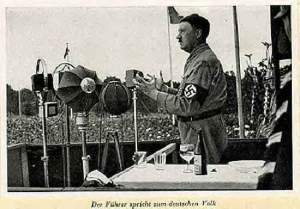
No peace can be the perpetuation of war. At some point the victor and the vanquished must find a way to join in mutual understanding and trust. For fifteen years the German People have waited and hoped that the end of the war would also bring an end to the hatred and enmity. But it seemed that the aim of the Treaty of Versailles was not to bring mankind lasting peace but instead to keep it in a state of permanent hatred. [For further details, Click here.]
1937 Nazi Germany: Professor von Verschuer protests to Reich Minister of Justice Guertner that his expert opinion incriminating the defendant in a "race dishonor trial," has not been accepted and as a result, the defendant has been set free.
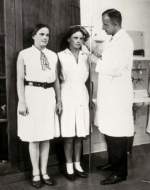
Otmar Freiherr von Verschuer was a German human biologist and eugenicist primarily concerned with "racial hygiene" and twin research. He was the director of the "Kaiser-Wilhelm-Institut fuer Anthropologie, menschliche Erblehre, und Eugenik" (KWIfA) ("Kaiser Wilhelm Institute of Anthropology, Human Heredity, and Eugenics") in Berlin and the "Institut fuer Erbbiologie und Rasssenhygiene" ("Institute for Genetic Biology and Racial Hygiene"). He received Heinrich Himmler's permission to work in Auschwitz from 1944 on. One of Verschuer's most well-known assistants was Josef Mengele, who later on became known as Auschwitz' "Angel of Death" as the chief SS physician at the death camp. Verschuer was never tried for war crimes despite many indications that he not only was fully cognizant of Mengele's work at Auschwitz, but even encouraged and collaborated with Mengele in some of his most grisly research. [For further details, Click here.]
1939 WW2 Various:
From a speech by Walter Funk:

Although all economic and financial departments were harnessed to the task of the Four Year Plan under the leadership of General Field Marshal Hermann Goering, Germany's economic preparation for war was also secretly advanced in another sector for well over a year, namely, through the formation of a national guiding apparatus for special war economy tasks which would have to be accomplished the moment that war became a fact. For this work all economic departments were combined into one administrative authority, the Plenipotentiary General for Economics, to which position the Fuehrer appointed me one and a half years ago.
War at Sea:
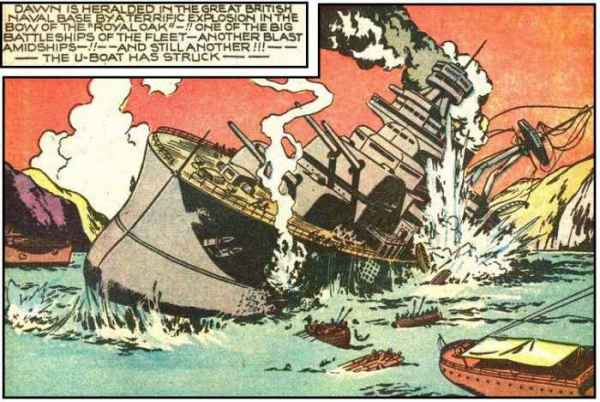
German submarine U-47 penetrates the defenses of Scapa Flow, the British naval base in the Orkney Islands, and sinks the battleship Royal Oak, killing 833.
The order was given: "both engines full ahead!" After the crew had enjoyed a hearty meal prepared by ship's cook Friedrich Walz, the U-boat silently made its way up towards the Holm Sound and the smaller and more heavily defended Kirk Sound, through which it would weave its way into Scapa Flow itself. [For further details, Click here.]
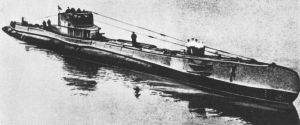
The Polish submarine Orzel arrives in Britain having escaped internment in Estonia.
1940 WWII: London: During the Blitz, a 1,400 kg (3,100 lb) semi-armour piercing fragmentation bomb falls on the road above Balham station, which was being used as an air-raid shelter, killing at least 64 people. [For further information, click here.]
1941 WW2: Various:
Barbarossa: German troops capture Rshev, 100 miles west of Moscow.
Washington (Nomura) to Tokyo:
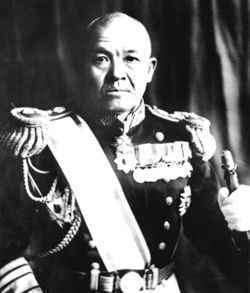
I had an interview with Rear Admiral TURNER. If I sum up what he told me, it is this: What the United States wants is not just a pretense but a definite promise. Should a conference of the two governments be held without a definite preliminary agreement, and should, in the meantime, an advance be made into Siberia, the President would be placed in a terrible predicament. Japan speaks of peace in the Pacific and talks as if she can decide matters independently, and so it would seem to me that Japan could set aside most of her obligations toward the Three-Power Alliance.
As to the question of withdrawing or stationing troops, since it is impossible to withdraw troops all at once, it would seem that a detailed agreement could be arranged between China and Japan for a gradual withdrawal, He speculates on the various difficulties which Japan had to face internally. It seems that this opinion of his has also been given to the Secretary of State. He said that should the Russo-German war suddenly end and should Germany offer Great Britain peace, it would after all be a German peace and England would not accept it. Now, this man is a responsible fellow in an important position and I take it that this is the view of the Navy.
On the other hand, HOOVER and his considerable following consider that should Moscow make a separate peace with Berlin and should Berlin then turn to London with generous peace terms, this whole fray would end with unimaginable quickness. CASTLE (former US Ambassador to Japan) told me that HUGH GIBSON feels the same way and that Japan, too, should be on the alert for this possibility. This, however, I take to be a minority view entertained by the Isolationists. MOORE (American legal adviser to the Japanese Embassy in Washington) reports that Secretary HULL told Senator THOMAS that he is proceeding patiently with the Japanese-American negotiations, but he hopes that Japan will not mistake this for a sign of weakness on America's part, and that no answer has arrived to the memos of October 2.
KIPLINGER (A Washington newspaper correspondent) reports that there is a very good basis for rumors of a cessation of hostilities between Russia and Germany and that the chances for war between Japan and the United States are fifty-fifty.
Holocaust: Beginning of the general deportation of German Jews to the concentration camps. (THP)
[See: Was the Holocaust Detrimental to Hitler's War Effort?]1942 WW2 Various:
From the minutes of a meeting of the General Staff of the Wehrmacht:
During the era of total warfare sabotage has become one of the most important elements in the conduct of war. It is sufficient to state our attitude to this question. The enemy will find evidence of it in the reports of our own propaganda units . . .
We have already announced by radio our intention of liquidating, in future, all groups of terrorists and saboteurs acting like bandits. Therefore the VVFSt has only to issue regulations to the troops how to deal with terrorist and sabotage groups . . .
In combat or in flight they are to be killed without mercy . . .Members of terrorist and sabotage groups of the British Army wearing uniform, who in the opinion of our troops are guilty of acting dishonorably or in any manner contrary to the law of nations, are to be kept in separate custody after capture . . . .
Instructions concerning the treatment to be inflicted upon them will be given by the WFSt in agreement with the Army legal service and the Counter-Intelligence Department, Foreign Section (Amt Ausland Abwehr) . . . . Violation of the laws of war by terrorist or sabotage troops is in the future always to be assumed when individual assailants as saboteurs or agents, regardless of whether they were soldiers or whatever their uniform might be, place themselves outside the laws of war by committing surprise attacks or brutalities which in the judgment of our troops are inconsistent with the fundamental rules of war . . .
In such cases the assailants will be killed without mercy to the last man, in combat or in flight . . . . Confinement in prisoner-of-war camps, even temporarily, is forbidden.
Stalingrad: In the northern part of Stalingrad, units of 6th Armee (von Paulus) advance in bitter fighting and surround the heavily defended Tractor Factory, following a series of devastating attacks (over 3,000 sorties) by bombers of Luftflotte 7 (von Richthofen).
[See: What Were Adolf Hitler's Major Blunders?]Hitler, in conversation with Albert Speer:

The A-4 is a measure that can decide the war. And what encouragement to the home front when we attack the English with it. This is the decisive weapon of the war, and what is more it can be produced with relatively small resources. Speer, you must push the A-4 as hard as you can! Whatever labor and materials they need must be supplied instantly. You know I was going to sign the decree for the tank program. But my conclusion now is: Change it around and phase it so that A-4 is put on a par with tank production. But in this project we can use only Germans. God help us if the enemy finds out about this business. (Speer)
From Exploring Space by William E. Burrows:

And the fertile German imagination ranged quite a bit beyond the vengeance weapons as rocketry made the transition from theory to well-established fact. Even as the engineers and technicians were working on the V-2 at Peenemuende in the early 1940s, a Stuttgart professor named Eugene Saenger laid out plans for a giant winged rocket plane, called an antipodal bomber, that would be able to skip along the top of the atmosphere like a flat stone on water and reach all the way to North America with ten tons of bombs. Plans called for the craft to be launched on a highly lubricated rail, its engine generating a fantastic 1.2 million pounds of thrust, and then carry its weapons load to New York, Washington, and Pittsburgh. (Note: Saenger's post-war work for the US will serve as the basis for the development of the X-15 and, ultimately, the Space Shuttle.) Another project, this one coming out of von Braun's shop, involved a monster ballistic missile that would be capable of producing four hundred thousand pounds of thrust and whose booster would have air brakes and a parachute so that it could be reused.
[See: Wunderwaffen: Hitler's Deception and the History of Rocketry.]1943 WW2: Various:
The US 8th Air Force delivers a heavy attack against the ball bearing plants at Schweinfurt but at a heavy price: of the original force of 291 B-17's, 198 are either shot down or damaged beyond repair, while the Luftwaffe lost about 40 fighter planes.
Russian Front: German forces evacuate the Zaporoshe bridgehead on the eastern bank of the Dnepr river.
Sobibor Uprising: A Jewish uprising, planned by Alexander Pechersky, a Soviet officer and also a Jew, together with other prisoners, breaks out at Sobibor. Eleven or twelve SS men, and about a dozen Ukrainian guards, are killed. Of the 600 Jews in the camp, 200 are shot or blown up in the minefields while escaping. 400 escape, of whom about 100 are later captured and killed. Others join Soviet partisan groups and are killed fighting; others die of typhus, and some are killed by hostile Poles. Only 30 are known to have survived the war, including Perchersky. (THP)
1944 WW2: Various:
British and Greek troops liberate Athens ending three years of WW2 occupation by German troops.
In an old fishing boat we moved up the old Corinth Canal to an air strip at Megara, it was there we were informed that the Parachute Reg would make an operational jump so we were ready for them. A gail [sic] force wind was blowing at their jump and we were kept busy cutting them from their chutes, quite a few hurt and a few drowned in the sea. The Germans in Athens a few miles up the road must have seen the Paras and decided to pull out of the city. Again we followed up and were lucky enough to be the first British troops to enter Athens. The [people] were out in the streets waving and throwing flowers to greet us, I got hit in the eye with a bunch that had a fir cone in it and got a black eye. I called it my war wound. We were greeted by the town Mayor and VIPs in the main square and given an empty hotel to live in. [For further details, Click here.]
"The Desert Fox" commits suicide:
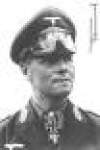
On this day in 1944, German Gen. Erwin Rommel, nicknamed "the Desert Fox," is given the option of facing a public trial for treason, as a co-conspirator in the plot to assassinate Adolf Hitler, or taking cyanide. He chooses the latter.
Rommel was born in 1891 in Wurttenberg, Germany, the son of a teacher. Although not descended from military men, the newly unified German empire made it fashionable to choose a military career, which young Rommel did, becoming an officer cadet. During World War I, he showed himself to be a natural leader with unnatural courage, fighting in France, Romania, and Italy. Following the war, he pursued a teaching career in German military academies, writing a textbook, Infantry Attacks, that was well regarded.
At the outbreak of World War II, Rommel was given command of the troops that guarded Hitler's headquarters, a disappointment for a man used to fighting on the front lines with the infantry. But in early 1940, he was given his chance to put to use his gifts, when he was given command of the 7th Panzer Division. Although a novice as far as mechanized forces were concerned, he soon mastered the advantages and proved his leadership abilities again in the German offensive against the French channel coast in May.
In early 1941, Rommel was given control of the troops sent to North Africa to aid Germany's ailing ally, Italy, in maintaining its position in Libya. It is here, in the deserts of North Africa, that Rommel earned his vaunted reputation, as well as his nickname (he became known for his "fox-like" sneak attacks). Winning significant victories against the British, whom he begrudgingly admired, Rommel nevertheless became weary of this theater of operations; he wanted to go back to Europe. It wasn't until a second battle to take el-Alamein in Egypt went against him that the "invincible" general was finally called home back to Europe.
Hitler put Rommel back in northern France, to guard against an Allied invasion. Rommel's suggestions for the precautions necessary to repel an enemy invasion were not heeded, and he began to lose confidence in Hitler and Germany's ability to win the war. When Rommel was approached by friends to agree to head the German government in the event of Hitler's overthrow, he agreed-although there was no explicit talk of assassination, which he found abhorrent.
D-Day was launched, and Rommel's prediction of disaster for Germany's position played itself out. Still, Hitler would not consider negotiations with the Allies. Rommel ended up in the hospital after his car was attacked by British bombers and he was forced off the road. Meanwhile, details of the failed assassination plot had come to Hitler's attention, including Rommel's contact with the conspirators. As Rommel was convalescing in his home at Herrlingen, two generals visited and offered him his choice-trial or suicide. Rommel told his wife and son what had transpired, and that he had chosen to take the cyanide capsules the generals had provided.
The German government gave Rommel a state funeral. His death was attributed to war wounds. (History.com)
Rommel's son:
The car stood ready. The S.S. driver swung the door open and stood to attention. My father pushed his Marshal's baton under his left arm, and with his face calm, gave Aldinger and me his hand once more before getting in the car. The two generals climbed quickly into their seats and the doors were slammed. My father did not turn again as the car drove quickly off up the hill and disappeared round a bend in the road. When it had gone Aldinger and I turned and walked silently back into the house. Twenty minutes later the telephone rang. Aldinger lifted the receiver and my father's death was duly reported. (Manfred Rommel) [For further details, Click here.]
1945 Nuremberg Tribunal: British representative Sir Geoffrey Lawrence is elected The President of the International Military Tribunal (IMT). (Maser II)
1947 Various:
Aviation: U.S. Air Force Captain Chuck Yeager becomes the first person to fly faster than the speed of sound. [For further information, click here]
Slave Labor: Defense counsel for Georg Rickhey, on trial in Germany, requests that Werner von Braun, Hitler's former chief rocket scientist, now working for the US, be made available to testify on Rickhey's behalf. The Army Ordnance staff refuses to allow it. However, since the serious nature of the charges against the defendant could result in a penalty of death, von Braun is allowed to swear a deposition. The questions posed by Rickhey's counsel are very narrow in scope, and von Braun is not asked anything that would tend to incriminate him. It should be noted, however, that while von Braun consistently professed to be uninvolved in the activities of the Mittelwerk, his answers reveal extensive knowledge of its operations:

Q: During your visit did you observe general working conditions in the Mittelwerk factory from May 1944 to April 1945?
A: Working conditions at the Mittelwerk were continuously improved during the entire period from the last months of 1943 up to my last visit to the plant. In the beginning, such condition were extremely primitive, since the tunnels … were not fit in any way for starting accurate production and to absorb many thousands of workers. Since a camp was not available, the prisoners were housed in the tunnels proper under the most primitive conditions. However, in the summer of 1944 considerable improvements had been made or were partly under construction. [For the full text, Click here.]
1950 Spandau Prison: From Spandau: The Secret Diaries, by Albert Speer:
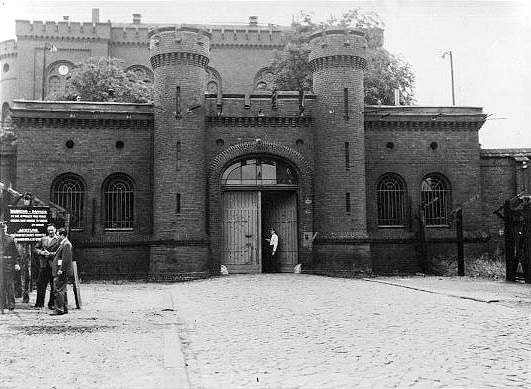
Schirach and Funk long ago succumbed to the temptation of taking a sleeping pill every night, year in and year out. That seems to be physically dangerous, and psychologically at least short-sighted.
1952 Spandau Prison: From Spandau: The Secret Diaries, by Albert Speer:
Big quarrel among all of us because of the lighting problem. Everyone wants something different. Doenitz, Neurath, Hess, and I are against Schirach's proposal that a weak blue bulb be screwed into the socket, because in that case we could no longer read. Violent discussion. Funk backs off ten paces and berates first Neurath and then all of us. When he starts using vulgar epithets, I shout back: "You sound like a truck driver!" He clears out. The first scene of this sort in seven years and, worse yet, in the presence of a guard.
1962 Cold War: Cuban Missile Crisis begins: "The Cuban Missile Crisis begins … bringing the United States and the Soviet Union to the brink of nuclear conflict. Photographs taken by a high-altitude U-2 spy plane offered incontrovertible evidence that Soviet-made medium-range missiles in Cuba—capable of carrying nuclear warheads—were now stationed 90 miles off the American coastline." [For further information, click here]
1964 Khrushchev ousted as premier of Soviet Union:
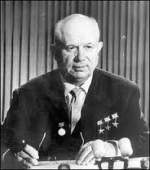
Nikita Khrushchev is ousted as both premier of the Soviet Union and chief of the Communist Party after 10 years in power. He was succeeded as head of the Communist Party by his former protégé Leonid Brezhnev, who would eventually become the chief of state as well. The new Soviet leadership increased military aid to the North Vietnamese without trying to persuade them to attempt a negotiated end to hostilities. With this support and no external pressure to negotiate, the North Vietnamese leadership was free to carry on the war as they saw fit. [For further information, click here]
Edited by Levi Bookin (Copy editor)
levi.bookin@gmail.com



Click to join 3rdReichStudies



Disclaimer: This site includes diverse and controversial materials--such as excerpts from the writings of racists and anti-Semites--so that its readers can learn the nature and extent of hate and anti-Semitic discourse. It is our sincere belief that only the informed citizen can prevail over the ignorance of Racialist "thought." Far from approving these writings, this site condemns racism in all of its forms and manifestations.
Fair Use Notice: This site may contain copyrighted material the use of which has not always been specifically authorized by the copyright owner. We are making such material available in our efforts to advance understanding of historical, political, human rights, economic, democracy, scientific, environmental, and social justice issues, etc. We believe this constitutes a "fair use" of any such copyrighted material as provided for in section 107 of the US Copyright Law. In accordance with Title 17 U.S.C. Section 107, the material on this site is distributed without profit to those who have expressed a prior interest in receiving the included information for research and educational purposes. If you wish to use copyrighted material from this site for purposes of your own that go beyond 'fair use', you must obtain permission from the copyright owner.
Please Note: The list-owner and the moderator of 3rdReichStudies are not responsible for, and do not necessarily approve of, the random ads placed on our pages by our web server. They are the unfortunate price one pays for a 'free' website.